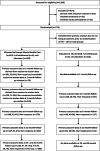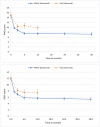Long-term outcomes at 24- and 36-month follow-up in the intervention arm of the randomized controlled trial of Prompt Mental Health Care
- PMID: 36076192
- PMCID: PMC9461100
- DOI: 10.1186/s12888-022-04227-0
Long-term outcomes at 24- and 36-month follow-up in the intervention arm of the randomized controlled trial of Prompt Mental Health Care
Abstract
Background: Whether long-term symptom improvement is maintained after treatment in services such as the Norwegian Prompt Mental Health Care (PMHC) and the English Improving Access to Psychological Therapies is not yet known. In this prospective study, we investigate whether improvements observed at 6-month follow-up are maintained at 24- and 36-month follow-up among clients who received PMHC.
Method: Data from the treatment arm of the randomized controlled trial of PMHC were used (n = 459). The main outcomes were (reliable) recovery rate and symptoms of depression (PHQ-9) and anxiety (GAD-7). Primary outcome data at 24- and 36-months follow-up were available for 47% and 39% of participants, respectively. Secondary outcomes were work participation, functional status, health-related quality of life, and positive mental well-being. Sensitivity analyses with regard to missing data assumptions were conducted for the primary continuous outcomes.
Results: Improvements were maintained at 24- and 36-month follow-up for symptoms of depression and anxiety, (reliable) recovery rate, and health-related quality of life. Small linear improvements since 6-month follow-up were observed for work participation, functional status, and positive mental well-being. Sensitivity analyses did not substantially alter the findings for symptoms of depression and anxiety mentioned above.
Conclusions: Our findings support the long-term effectiveness of PMHC, but results should be interpreted with caution due to lacking follow-up data at 24- and 36-month in the control group, and substantial attrition.
Keywords: Anxiety; CBT; Depression; IAPT; Long-term outcomes; Prompt Mental Health Care.
© 2022. The Author(s).
Conflict of interest statement
The authors have no conflicts of interest to declare.
Figures



Similar articles
-
Effectiveness of Prompt Mental Health Care, the Norwegian Version of Improving Access to Psychological Therapies: A Randomized Controlled Trial.Psychother Psychosom. 2020;89(2):90-105. doi: 10.1159/000504453. Epub 2019 Dec 3. Psychother Psychosom. 2020. PMID: 31794968 Free PMC article. Clinical Trial.
-
Prompt mental health care, the Norwegian version of IAPT: clinical outcomes and predictors of change in a multicenter cohort study.BMC Psychiatry. 2018 Aug 16;18(1):260. doi: 10.1186/s12888-018-1838-0. BMC Psychiatry. 2018. PMID: 30115041 Free PMC article.
-
Long-term outcomes of Prompt Mental Health Care: A randomized controlled trial.Behav Res Ther. 2020 Dec;135:103758. doi: 10.1016/j.brat.2020.103758. Epub 2020 Oct 20. Behav Res Ther. 2020. PMID: 33129157 Clinical Trial.
-
Long-term outcome of cognitive behaviour therapy clinical trials in central Scotland.Health Technol Assess. 2005 Nov;9(42):1-174. doi: 10.3310/hta9420. Health Technol Assess. 2005. PMID: 16266559 Review.
-
Psychological therapies for anxiety and depression in children and adolescents with long-term physical conditions.Cochrane Database Syst Rev. 2018 Dec 22;12(12):CD012488. doi: 10.1002/14651858.CD012488.pub2. Cochrane Database Syst Rev. 2018. PMID: 30578633 Free PMC article.
Cited by
-
Brief CBT-based psychological interventions to improve mental health outcomes in refugee populations: a systematic review and meta-analysis.Eur J Psychotraumatol. 2024;15(1):2389702. doi: 10.1080/20008066.2024.2389702. Epub 2024 Aug 30. Eur J Psychotraumatol. 2024. PMID: 39212049 Free PMC article.
-
Cost-benefit of IAPT Norway and effects on work-related outcomes and health care utilization: results from a randomized controlled trial using registry-based data.Psychol Med. 2025 Mar 13;55:e86. doi: 10.1017/S003329172500025X. Psychol Med. 2025. PMID: 40719346 Free PMC article. Clinical Trial.
References
-
- Cuijpers P, Berking M, Andersson G, Quigley L, Kleiboer A, Dobson KS. A meta-analysis of cognitive-behavioural therapy for adult depression, alone and in comparison with other treatments. Can J Psychiatry Revue Canadienne de Psychiatrie. 2013;58(7):376–385. doi: 10.1177/070674371305800702. - DOI - PubMed
Publication types
MeSH terms
LinkOut - more resources
Full Text Sources
Medical

